Aadhaar Seeding: Enhancing Transparency in MGNREGS Job Card Management
The Indian government annually issues around sixty lakh new job cards under the Mahatma Gandhi National Rural Employment Guarantee Scheme (MGNREGS) and claims no involvement in job card deletions. The process is attributed to factors such as Aadhaar seeding, migration, and death, with the central role remaining unconnected.

- Country:
- India
The government has clarified its stance on the issuance and deletion of job cards under the Mahatma Gandhi National Rural Employment Guarantee Scheme (MGNREGS), asserting its non-involvement in the process. Around sixty lakh new job cards are issued each year, while thirty lakh are deleted due to various factors, including Aadhaar seeding to enhance transparency in the system.
Addressing Parliament, Minister of State for Rural Development Chandra Sekhar Pemmasani stated that a significant portion of the rural development budget supports MGNREGS, with 57% allocated to it. Aadhaar-seeding, he highlighted, has increased transparency and is not an obstacle for the scheme. Pemmasani refuted claims by Congress leader K C Venugopal regarding deletions linked to Aadhaar requirements.
The minister provided clarity on the deletion of job cards, explaining that reasons range from duplicate or fake entry to demographic changes, such as moving locations or death. State governments, not the central government, are tasked with managing these deletions. Pemmasani stressed the importance of maintaining transparency and authenticity within the scheme.
(With inputs from agencies.)
ALSO READ
Colombia Faces Budget Adjustments to Meet Fiscal Rule
Colombia Faces Fiscal Challenge with Massive Budget Cuts
Colombia's Fiscal Challenge: Budget Adjustments Loom Large
Retail Titans Warn UK Government: Budget Threatens Jobs and Prices
Assocham Calls for Streamlined TDS and Tax Neutrality in Pre-Budget Proposal










